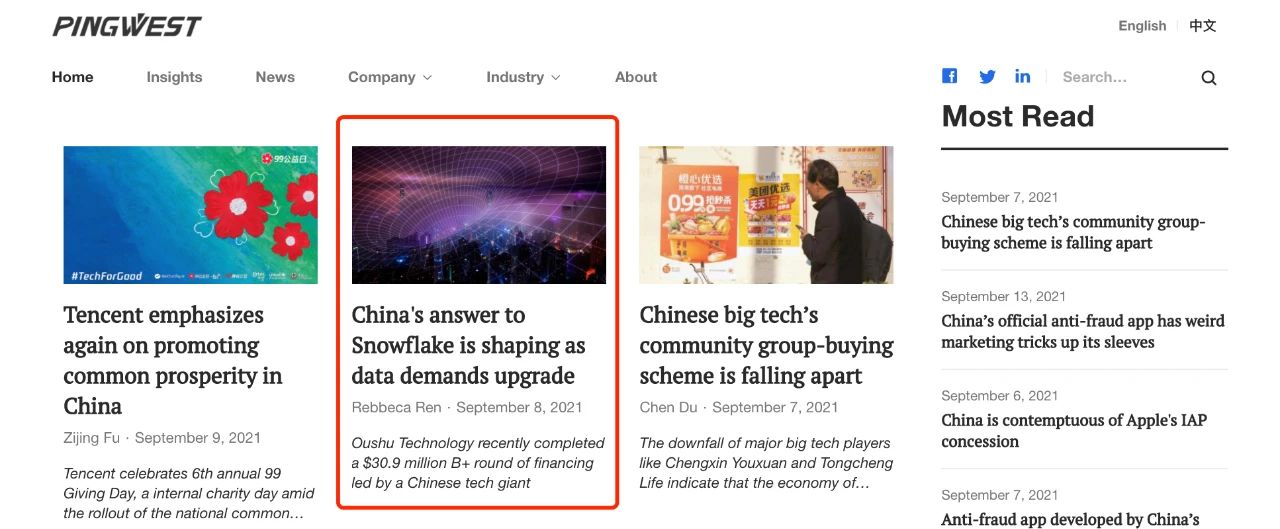Pingwest 采访偶数科技:数据需求升级,中国的 Snowflake 答案

(英文原文发表在Pingwest,原标题:China's answer to Snowflake is shaping as data demands upgrade,Pingwest 一直在寻找对标 Snowflake 的国内云数仓赛道黑马,偶数科技脱颖而出成为最佳访谈对象)
去年,云数仓公司 Snowflake 在纽约证券交易所首次亮相,并在第一个交易日市值翻倍,令华尔街大为震惊。Snowflake 得到了沃伦巴菲特的伯克希尔哈撒韦公司在资本市场上的背书,使云数据仓库这一基础服务成为人们关注的焦点。
现在,随着云计算的加速和数据量的激增,与 Snowflake对标的中国云数仓公司偶数科技正快速发展。
8 月 24 日,偶数宣布完成了近 2 亿元人民币的 B+ 轮融资。近日,偶数科技创始人 & CEO 常雷接受品玩(PingWest)采访,就云原生数据库主题进行了深入交流,以飨读者。
想要弄清楚什么是数据仓库以及它的潜力,首先要弄清楚它与数据库概念的异同。传统数据库使用在线事务处理(OLTP)快速删除、插入和更新大量的短时在线事务;而数据仓库是一种分析型数据库,使用在线分析处理 (OLAP) 快速分析大量数据。
简而言之,数据库旨在记录数据,而数据仓库旨在分析数据。数据库对于小型原子事务非常有用,而数据仓库更适合需要复杂分析的关键问题。
如今,传统的数据库不适合继续处理像机器学习或预测分析等创新场景产生的海量数据;随着企业产生的数据量不断增加,通过BI(商业智能)获得竞争优势更为迫切,以及基础设施维护成本上升等因素,大型企业正在转向获得高效、灵活和可扩展的云原生数据仓库解决方案。
偶数科技于2016年成立,OushuDB 是该公司核心产品,创始人兼CEO常雷将偶数定位为中国云原生数仓的领跑者。
常雷博士毕业于北京大学计算机系,曾任EMC高级研究员,同时是著名的 Apache 软件基金会顶级开源项目HAWQ 的创建者。
“OushuDB 采用云原生架构,存储和计算分离,因此更容易扩展,可以提供企业用户实际需要的资源,然后随着业务需求的变化扩展或撤回资源,”常雷表示。
近年来,随着中国数字化的深入以及宏观政策鼓励企业采用云服务,数据仓库的需求快速增长。作为中国两大云服务提供商,阿里巴巴和腾讯也毫不意外地将目光投向了这里,并基于开源项目推出了自己的数据仓库解决方案。
常雷表示:“我们对自己的技术能力充满信心。中立性、灵活性和可扩展性是我们获得客户信任的关键因素。公司在公有云上与主流云服务商合作来服务客户,可以像 SaaS 服务一样运营的 OushuDB 不仅可以运行在阿里云、腾讯云、华为云、AWS、微软Azure等公有云上,还可以在私有云上运行“。
偶数认为,使用可插拔架构整合各种存储(包括如亚马逊的对象存储S3,偶数自主开发的分布式表存储Magma等)使其领先于竞争对手。它不仅支持传统的T+1批处理,而且还适用于实时处理。
云数据仓储服务在中国尚处于起步阶段,国内大部分企业仍专注于在事物型数据库领域,延续着甲骨文的路线及竞争模式。援引研究和咨询公司 Gartner :北美的分析数据库市场(数据仓库)的规模已经超过了传统事务型数据库。
“中国的数据仓库也在朝着同一个方向发展,我相信未来,像Snowflake、Databricks这样有影响力的公司会在这里诞生”常雷说。
这家总部位于北京的公司发展迅速,其中 85% 的员工为技术研发人员。现在,它的客户遍布从国有银行到 VMware 等国际公司。
根据 MarketsandMarkets 发布的最新研究包括显示:“全球数仓即服务市场预计将以 22.3% 的复合年增长率增长,到2026年市场规模将从 47亿美元增长到达 129亿美元”。

Last year, the cloud-based data warehouse company Snowflake made its debut on the New York Stock Exchange and doubled its market value on the first trading day, stunning Wall Street. The success of Warren Buffett's Berkshire Hathaway-backed tech firm has brought data warehousing, an underlying service, into the spotlight.
Now, with the acceleration of cloud computing and the surge in data volume, China's equivalent of Snowflake has embarked on the fast lane.
On August 24, Oushu completed the Series B+ financing of nearly 200 million yuan ($30.93 million) led by a Chinese tech giant and existing investors including Sequoia Capital China and Redpoint China Ventures. According to Crunchbase data.
The first step in figuring out what a Data Warehouse is and why it has such potential is to distinguish it from the Database. The Database uses OnLine Transactional Processing (OLTP) to delete, insert, replace quickly, and update large numbers of short online transactions. In contrast, the Data Warehouse uses OnLine Analytical Processing (OLAP) to swiftly analyze massive volumes of data.
In a nutshell, the Database is designed to record data while the data warehouse is designed to analyze data. Databases are most useful for small atomic transactions, and data warehouses are best suited for more critical questions that require a higher level of analysis.
Nowadays, traditional databases cannot handle big data from new sources or innovations like machine learning or predictive analytics. Therefore, attributed to factors including the increasing amount of data generated by enterprises, the burgeoning need for Business Intelligence (BI) to gain competitive advantages, and rising maintenance costs, larger firms are turning to data warehouse solutions for efficient, flexible, and scalable storage.
Established in 2016 by CEO Chang Lei, a former EMC senior researcher, Oushu positions itself as the frontrunner of the sector in China. OushuDB, the company's core product, is a cloud-native data warehouse built by the founding team of Apache HAWQ, an open-source project under the reputable Apache Software Foundation. Chang, who graduated with a PhD in computer science from Peking University, is the creator of Apache HAWQ.
"OushuDB adopts a cloud-native architecture and separates storage and computation, so it's easier to scale as companies can provision the resources they actually need and then expand or withdraw capacity as business needs change," said the CEO.
In China, with the deepening of digitization and the government encouraging enterprises to adopt cloud services, the demand for data warehouses has grown speedily in recent years. As China's top two cloud service providers, Alibaba and Tencent, have unsurprisingly set their sights here and have rolled out their own data warehousing solutions based on open source projects, threatening independent players.
Speaking of competition, Chang said, "We have full confidence in our technical capabilities. Neutrality, flexibility, and scalability are the key factors for us to gain the trust of clients." Although the company needs to cooperate with mainstream cloud service providers to serve customers, OushuDB, which works like a SaaS service, can not only run on public clouds such as Alibaba Cloud, Tencent Cloud, Huawei Cloud, AWS and Microsoft Azure, but also on private ones.
The startup believes that features like accommodating pluggable storage and integrating various storage, including object storage such as Amazon's S3 and and its self-developed distributed table storage Magma, set it ahead of competitors. It not only supports the conventional T+1 batch processing but also works for real-time processing.
Cloud data warehousing service is in its early stages in China, and most domestic players are still focusing on competing with Oracle in the transactional database field. Citing research and advisory firm Gartner, Oushu said the size of the analytical database market (Data Warehouse) had surpassed that of traditional transactional databases in North America.
"China's data warehouse industry is also moving toward the same direction, and I believe that in the future, influential companies like Snowflake and Databricks will be born here," Chang said.
Starting with a team of fewer than 10 people, the Beijing-headquartered startup is developing rapidly and has evolved into a company of 200 employees, of which 85% are in the engineering department. Now, its clients span from state-owned banks to international companies, such as VMware.
According to the latest research published by MarketsandMarkets. China is the leading country in Asia-Pacific in terms of adopting data warehouse services. According to the report, companies in the region continue to focus on improving their customer service to drive competitive differentiation and revenue growth.
来源:Pingwest



